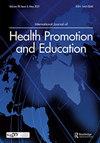培训医学生促进埃及预防性结直肠癌癌症筛查
IF 0.7
Q3 EDUCATION, SCIENTIFIC DISCIPLINES
International Journal of Health Promotion and Education
Pub Date : 2022-11-04
DOI:10.1080/14635240.2022.2142833
引用次数: 0
摘要
摘要癌症结直肠癌筛查早期发现癌前病变和息肉,提供更多的治疗选择和更高的生存能力。筛查在埃及尤为重要,因为埃及没有全国癌症筛查指南;医生通常只有在患者出现症状后才要求进行结肠镜检查,并且年龄较小的CRC发生率(30-49岁 年)更高。我们设计并实施了一项大肠癌癌症筛查干预的试点培训计划,其中我们招募并培训了医学生作为“健康冠军”,为患者提供关于该疾病的一对一教育,并分发粪便潜血检测试剂盒的无成本凭证。健康冠军随后向患者报告结果,并鼓励那些结果异常的患者进行无症状结肠镜检查,并在必要时进行后续癌症治疗。干预前和干预后的调查评估了健康冠军对癌症结直肠的认识、信心水平以及与患者沟通和促进行为改变的能力。参与者在埃及亚历山大实施之前接受了为期三天的培训。13名参与者完成了健康冠军培训,其中一半是医学二年级的学生。在2019年12月至2020年3月期间,健康冠军通过招募117名无症状患者并为他们提供教育和筛查试剂盒代金券,展示了他们所学到的东西。健康冠军对结直肠癌癌症风险的了解增加了46.1%,对筛查方案的了解增加35.7%,对结直肠癌癌症治疗方案的了解提高了57.1%。该可行性培训试点成功地提高了健康倡导者在启动和支持健康行为改变方面的知识和技能,同时使他们熟悉启动患者预防性筛查。本文章由计算机程序翻译,如有差异,请以英文原文为准。
Training medical students to promote preventive colorectal cancer screening in Egypt
ABSTRACT Colorectal cancer screening identifies pre-cancerous lesions and polyps earlier, affording more treatment options and higher survivability. Screening is especially important in Egypt, where there are no national colorectal cancer screening guidelines; physicians typically order colonoscopy only after patients are symptomatic, and younger-age CRC rates (ages 30–49 years) are higher. We designed and implemented a pilot training program for a colorectal cancer screening intervention wherein we recruited and trained medical students as ‘Health Champions’ to provide one-on-one education to patients about the disease and distribute no-cost vouchers for fecal occult blood test kits. Health Champions then reported results to patients and encouraged those with abnormal results to follow-up for a no-cost colonoscopy and subsequent cancer treatment, if indicated. Pre- and post-intervention surveys assessed the Health Champions’ colorectal cancer awareness, confidence levels, and abilities regarding patient communication and promotion of behavior change. Participants received three days of training before implementation in Alexandria, Egypt. Thirteen participants completed Health Champion training, half of whom were second-year medical students. Between December 2019 and March 2020, Health Champions demonstrated what they learned by recruiting 117 asymptomatic patients and providing them with education and screening kit vouchers. There were increases of 46.1% in Health Champions’ knowledge of colorectal cancer risks, 35.7% in knowledge of screening options, and 57.1% in awareness of treatment options for colorectal cancer post-training. This feasibility training pilot successfully increased Health Champions’ knowledge and skills associated with initiating and supporting health behavior changes while familiarizing them with initiating preventive screenings for patients.
求助全文
通过发布文献求助,成功后即可免费获取论文全文。
去求助
来源期刊

International Journal of Health Promotion and Education
EDUCATION, SCIENTIFIC DISCIPLINES-
CiteScore
2.30
自引率
10.00%
发文量
69
 求助内容:
求助内容: 应助结果提醒方式:
应助结果提醒方式:


